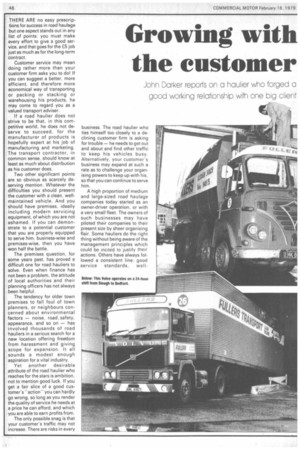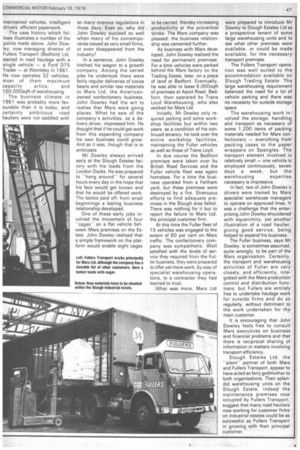Growing with the customer
Page 48

Page 49

If you've noticed an error in this article please click here to report it so we can fix it.
John Darker reports on a haulier who forged a good working relationship wn one big client
THERE ARE no easy prescriptions for success in road haulage
but one aspect stands out in any list of points: you must make every effort to give a good service, and that goes for the E5 job just as much as for the long-term contract.
Customer service may mean doing rather more than your customer firm asks you to do! If you can suggest a better, more efficient, and therefore more economical way of transporting or packing or stacking or warehousing his products, he may come to regard you as a valued transport adviser.
If a road haulier does not strive to be that, in this competitive world, he does not deserve to succeed, for the manufacturer of products is hopefully expert at his job of manufacturing and marketing. The transport contractor, in common sense, should know at least as much about distribution as his customer does Two other significant points• are so obvious as scarcely deserving mention. Whatever the difficulties you should present the customer with a clean, wellmaintained vehicle. And you should have premises, ideally including modern servicing equipment, of which you are not ashamed. If you can demonstrate to a potential customer that you are properly equipped to serve him, business-wise and premises-wise, then you have won half the battle.
The premises question, for some years past, has proved a difficult one for road hauliers to solve. Even when finance has not been a problem, the attitude of local authorities and their planning officers has not always been helpful.
The tendency for older town premises to fall foul of town planners, or neighbours concerned about environmental factors — noise, road, safety, appearance, and so on — has involved thousands of road hauliers in a serious search for a new location offering freedom from harassment and giving scope for expansion. It all sounds a modest enough aspiration for a vital industry.
Yet another desirable attribute of the road haulier who reaches for the stars is ambition, not to mention good luck. If you get a fair slice of a good customer's "actionyou can hardly go wrong, so long as you render the quality of service he needs at a price he can afford, and which you are able to earn profits from.
The only possible snag is that your customer's traffic may not increase. There are risks in every business. The road haulier who ties himself too closely to a declining customer firm is asking for trouble — he needs to get out and about and find other traffic to keep his vehicles busy. Alternatively, your customer's business may expand at such a rate as to challenge your organising powers to keep up with his, so that you can continue to serve him.
A high proportion of medium and large-sized road haulage companies today started as an owner-driver operation, or with a very small fleet. The owners of such businesses may have piloted their companies to their present size by sheer organising flair. Some hauliers do the right thing without being aware of the management principles which could be incited to justify their actions. Others have always followed a consistent line: good service standards, well maintained vehicles, intelligent drivers, efficient paperwork.
The case history which follows illustrates a number of the points made above. John Dowley, now managing director of Fullers Transport (Bedfont) Ltd, Started in road haulage with a single vehicle — a Ford D75 Trader — at Wembley in 1961. He now operates 32 vehicles, most of them maximum capacity artics, and 150,000sqft of warehousing.
The business climate in 1 961 was probably more favourable than it is today, and certainly ambitious road hauliers were not saddled with so many onerous regulations in those days. Even so, why did John Dowley succeed so well when many of his contemporaries stayed as very small firms, or even disappeared from the industry?
In a sentence, John Dowley hitched his wagon to a growth company. Among the varied jobs he undertook there were fairly regular deliveries of cocoa beans and similar raw materials to Mars Ltd, the Americanowned confectionery business. John Dowley had the wit to realise that Mars were going places. What he saw of the company's activities, as a delivery driver, impressed him. He thought that if he could get work from this expanding company his own business could grow. And so it was, though that is to anticipate.
Mr Dowley always arrived early at the Slough Estates factory with his loads from the London Docks. He was prepared to "hang around" for several hours every day in the hope that his face would get known and that he would be offered work. The tactics paid off; from small beginnings a lasting business relationship developed.
One of these early jobs involved the movement of four "cages" on a flat vehicle between Mars premises on the Estate. John Dowley realised that a simple framework on the platform would enable eight cages to be carried, thereby increasing productivity at the proverbial stroke. The Mars company was pleased; the business relationship was cemented further.
As business with Mars developed, John Dowley realised the need for permanent premises.
For a time vehicles were parked behind the Mars factory on the Trading Estate, later, on a piece of land at Bedfont. Eventually, he was able to lease 6,000sqft of premises at Ascot Road, Bedfont, then operated by Trans Loyd Warehousing, who also worked for Mars Ltd.
lnitially. Mr Dowley only required parking and some work shop facilities but within two years, as a condition of his continued tenancy, he took over the entire workshop facilities, maintaining the Fuller vehicles as well as those of Trans Loyd.
In due course the Bedfont premises were taken over by British Road Services and the Fuller vehicle fleet was again homeless. For a time the busi ness operated from a Feltham yard, but these premises were destroyed by a fire. Strenuous efforts to find adequate premises in the Slough area failed. There was nothing for it but to report the failure to Mars Ltd, the principal customer firm, At this time the Fuller fleet of 15 vehicles was engaged to the extent of 60 per cent on Mars traffic. The confectionery company was sympathetic. Well satisfied with the levels of service they required from the Fuller business, they were prepared to offer yet more work, by way of specialist warehousing operations, to a contractor they had learned to trust.
What was more, Mars Ltd were prepared to introduce Mr Dowley to Slough Estates Ltd as a prospective tenant of some large warehousing units and to see what other premises were available, or could be made available, for the necessary transport premises.
The Fullers Transport operation was well suited to the accommodation available on Slough Trading Estate. The large warehousing requirement balanced the need for a lot of vehicle parking and there was no necessity for outside storage space.
The warehousing work involved the storage, handling and transport as necessary of some 1,200 items of packing materials needed for Mars confectionery — everything from packing cases to the paper wrappers on Spangles. The transport element involved is relatively small — one vehicle is employed continuously, seven days a week, but the warehousing expertise necessary is impressive.
In fact, two of John Dowley's drivers were trained by Mars specialist warehouse managers to operate on approved lines. It was a challenge that the enterprising John Dowley shouldered with equanimity, yet another illustration of a road haulier, giving good service, being helped to expand his business.
The Fuller business, says Mr Dowley, is sometimes assumed, quite wrongly, to be part of the Mars organisation Certainly, the transport and warehousing activities of Fuller are very closely, and efficiently, integrated with the Mars production control and distribution functions, but Fullers are entirely free to undertake haulage work for outside firms and do so regularly, without detriment to the work undertaken for the main customer.
It is encouraging that John Dowley feels free to consult Mars executives on business and financial problems and that there is reciprocal sharing of information in matters involving transport efficiency, Slough Estates Ltd, the "silent" partner of both Mars and Fullers Transport, appear to have acted as fairy godmother to both organisations. Their splendid warehousing units on the Slough Estate, indeed the maintenance premises now occupied by Fullers Transport, suggest that many road hauliers now working for customer firms on industrial estates could be as successful as Fullers Transport in growing with their principal customer,




















































































































